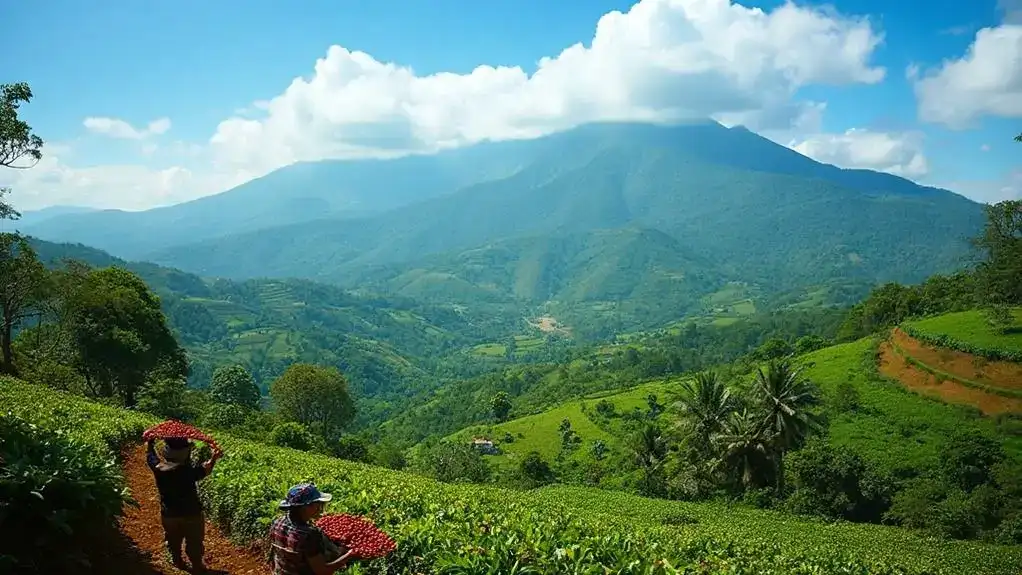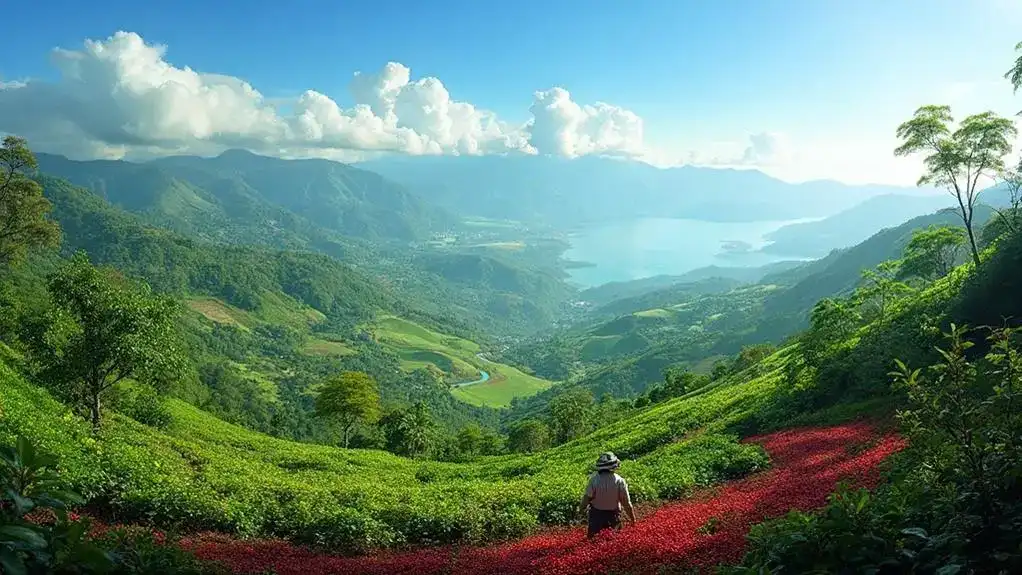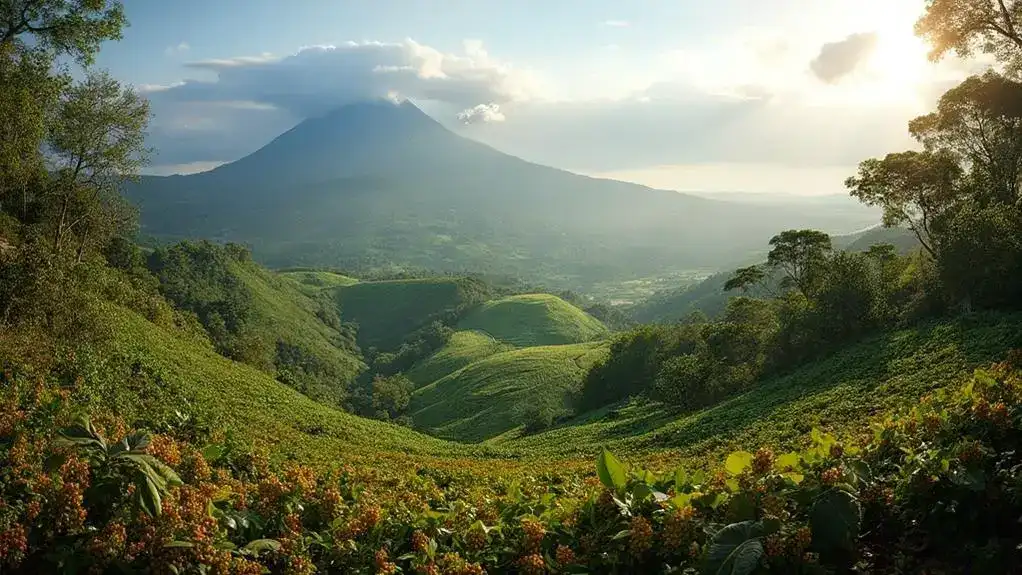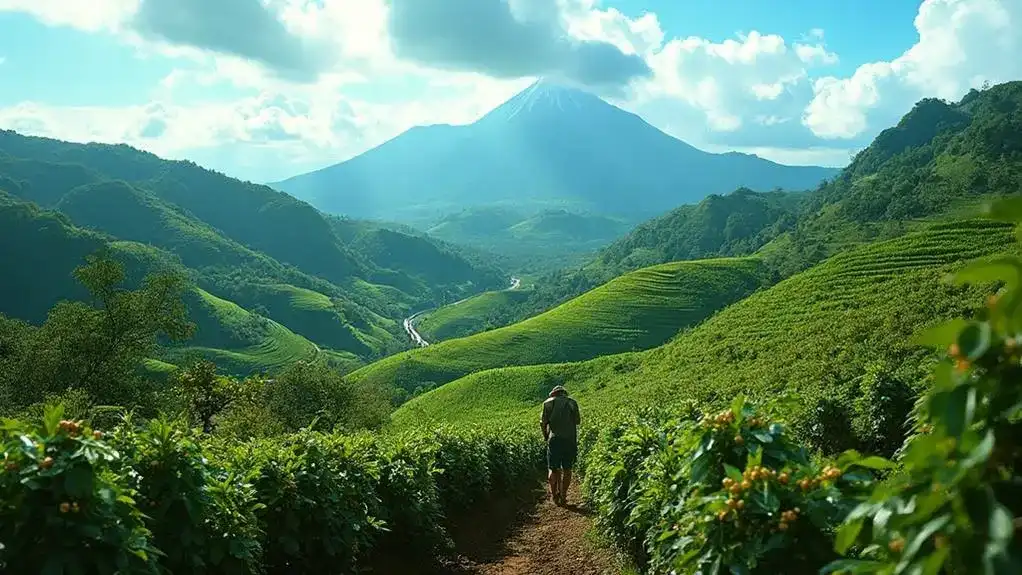El Salvador’s coffee quality is profoundly influenced by its geography, which includes high elevations, rich volcanic soils, and diverse microclimates. Regions like Ahuachapan and Santa Ana benefit from fertile volcanic earth, enhancing flavors and nurturing premium varieties like Bourbon and Pacamara. The altitude slows the maturation of coffee cherries, allowing for complex flavor development. Additionally, each region’s unique climate contributes distinct taste profiles, from fruity to nutty. Sustainable farming practices further improve the overall quality of the beans. Exploring these aspects can deepen your understanding of why El Salvador’s coffee is so renowned for its exceptional flavors.
El Salvador Major Coffee Growing Regions

When exploring the major coffee growing regions of El Salvador, you’ll find a variety of unique characteristics that influence flavor profiles.
Each area contributes distinct qualities to the coffee, making them remarkable in the global market.
Here are three key regions to evaluate:
- Ahuachapan – Known for its rich volcanic soil and high elevations.
- Chalatenango – Offers complex flavors due to its unique microclimate.
- La Libertad – Delivers bright and fruity coffees with floral notes.
Ahuachapan
Ahuachapan stands out as one of El Salvador’s premier coffee-growing regions, offering a unique blend of rich volcanic soil and high elevations.
The Ahuachapan terroir greatly influences the flavor profiles of its coffee, resulting in exquisite cups that many coffee lovers appreciate. The region primarily produces Bourbon and Pacas varieties, known for their sweet, balanced flavors and bright acidity.
With its diverse microclimates, Ahuachapan creates ideal conditions for developing complex taste notes, ranging from fruity to nutty. Additionally, many farmers adopt sustainable practices, enhancing the quality of Ahuachapan coffee.
As you explore the offerings from this region, you’ll discover a delightful array of flavors that truly reflect the distinct characteristics of Ahuachapan’s unique environment.
Chalatenango
Chalatenango is another standout region in El Salvador’s coffee landscape, known for its unique microclimate and high elevations. Here, you’ll discover Chalatenango coffee, which thrives in the cooler temperatures and rich volcanic soil.
This region’s distinct geography contributes to its unique flavors, often characterized by complex notes of chocolate and fruit. The high altitudes allow the coffee cherries to mature slowly, enhancing the depth and richness of the beans.
Farmers in Chalatenango prioritize sustainable practices, ensuring the preservation of their environment while producing high-quality coffee. As you explore this region, you’ll find that Chalatenango coffee not only reflects the local terroir but also offers a delightful experience for those seeking exceptional and diverse flavor profiles.
La Libertad
La Libertad stands out among El Salvador’s coffee-growing regions due to its diverse microclimates and elevations, which create a unique environment for coffee cultivation.
You’ll find that La Libertad’s coffee often showcases bright and fruity flavors, enhanced by floral notes that attract coffee enthusiasts.
The region’s terroir plays a vital role in developing these distinct characteristics, thanks to the interplay of volcanic soil and varied climates.
Producers in La Libertad are known for their innovative processing techniques, such as honey and natural methods, which further elevate the coffee’s profile.
Santa Ana
While exploring El Salvador’s coffee-growing regions, you can’t overlook Santa Ana, which is celebrated for its exceptional coffee quality.
This region’s volcanic soil and high elevation create ideal conditions for cultivating premium coffee varieties, particularly Pacamara. The unique coffee characteristics from Santa Ana include a vibrant acidity and complex flavor profiles, often featuring fruity and floral notes.
Farmers here focus on sustainable practices, further enhancing the quality of their beans. The cool temperatures and abundant rainfall during the growing season contribute to the slow maturation of the coffee cherries, resulting in rich, aromatic flavors.
As a result, Santa Ana has gained recognition not just locally, but also in international coffee markets, making it an essential part of El Salvador’s coffee heritage.
San Salvador
San Salvador stands out not just as the capital of El Salvador but also as a vibrant coffee-growing region. The city’s unique blend of urban culture and traditional farming practices creates a dynamic coffee scene. Here, you’ll find coffee farms producing beans with balanced acidity and sweetness, catering to local tastes. This region’s coffee reflects the rich San Salvador culture, showcasing both innovative processing techniques and the historical significance of coffee in the area.
| Variety | Flavor Notes | Popular Use |
|---|---|---|
| Bourbon | Sweet, Fruity | specialty coffee |
| Pacas | Balanced, Smooth | Local Markets |
| Typica | Complex, Rich | Espresso |
| Caturra | Bright, Floral | Brewed Coffee |
| Pacamara | Unique, Bold | Specialty Roasts |
Morazan
Morazan is one of El Salvador’s hidden gems for coffee production, boasting a community-driven approach that emphasizes sustainability.
In this eastern region, farmers work together through community collaboration to enhance their coffee-growing practices. By sharing resources and knowledge, they foster a culture of support that elevates both quality and sustainability in coffee production.
The family-run farms here produce beans that reflect the local terroir, resulting in unique flavor profiles that coffee lovers appreciate.
Additionally, many producers focus on eco-friendly methods, ensuring that their agricultural practices benefit the environment.
Morazan’s commitment to community and sustainability makes it a remarkable area for those interested in high-quality, responsibly produced coffee.
Cabañas
Cabañas is emerging as a notable coffee-growing region in El Salvador, recognized for its high-quality Arabica beans.
This region’s unique Cabañas terroir, characterized by rich volcanic soil and varying elevations, contributes to the exceptional flavors found in its coffee.
Farmers here are increasingly adopting innovative processing methods, which enhance the coffee’s taste and aroma.
Many producers are also pursuing organic practices, aligning with consumer demand for sustainable coffee options.
As you explore Cabañas coffee, you’ll find a delightful balance of sweetness and acidity, making it appealing to both casual drinkers and connoisseurs.
The dedication of local farmers to quality and sustainability positions Cabañas as a rising star in the world of specialty coffee.
Sonsonate
While exploring El Salvador’s coffee growing regions, you’ll find Sonsonate stands out for its warm climate and fertile soil, which are perfect for coffee cultivation. The region produces smooth coffee with mild flavors, making it a favorite among both local and international markets. Sonsonate processing methods, including washed and honey processes, further enhance the coffee’s quality and flavor profile.
| Flavor Notes | Processing Methods | Popular Varieties |
|---|---|---|
| Mild, Sweet | Washed | Bourbon |
| Fruity, Smooth | Honey | Pacas |
| Balanced | Natural | Caturra |
These characteristics contribute to the uniqueness of Sonsonate, ensuring it remains an important player in El Salvador’s coffee landscape.
La Paz
La Paz, nestled in the highlands of El Salvador, is a key coffee-growing region known for its exceptional quality.
The unique geography here, with high altitudes and rich volcanic soil, contributes to the distinctive characteristics of La Paz coffee. You’ll find that the beans often exhibit bright acidity and a variety of flavor notes, ranging from fruity to floral.
Farmers in La Paz are dedicated to experimenting with different processing methods, which further enhances the complexity of their coffees. This commitment to quality guarantees that La Paz flavor stands out in the specialty coffee market.
As you explore this region, you’ll appreciate how its natural conditions shape the rich coffee profiles that are highly sought after by connoisseurs.
Usulután
Usulután stands out as a vibrant coffee-growing region in El Salvador, where the rich volcanic soil and diverse ecosystems create ideal conditions for coffee cultivation.
The Usulután terroir is characterized by its unique combination of altitude, climate, and biodiversity, supporting the growth of flavorful coffee beans. Here, shade-grown coffee thrives, benefiting both the plants and the surrounding environment.
Usulután coffee is known for its complex flavor profiles, often featuring bright acidity and fruity notes. Farmers in this region prioritize sustainable practices, ensuring that their coffee not only tastes great but also supports ecological health.
San Vicente
San Vicente is gaining recognition as a significant coffee-growing region in El Salvador, thanks to its rich volcanic soil and favorable climate.
This area’s coffee, known as San Vicente Coffee, is well-regarded for its unique flavor profiles that often highlight chocolate and nutty undertones.
The farmers here skillfully combine traditional farming methods with innovative processing techniques, enhancing the quality of their beans.
The altitude and microclimates found within San Vicente further contribute to the complexity of flavors, making it an appealing choice for specialty coffee lovers.
As you explore the coffees from this region, you’ll discover a rich tapestry of tastes that reflect the dedication and expertise of San Vicente’s coffee producers.
Santa Ana Volcano
Nestled around the majestic Santa Ana Volcano, this region is an essential hub for coffee cultivation in El Salvador. The volcanic influence enriches the soil, providing vital nutrients that contribute to the distinctive flavors of the coffee. High elevations also play a role, enhancing the acidity and complexity of the beans.
| Feature | Description | Impact on Coffee |
|---|---|---|
| Altitude | 1,300 – 2,000 meters | Enhances acidity and flavor |
| Soil Type | Volcanic ash | Nutrient-rich, promotes growth |
| Climate | Moderate temperatures | Ideal for Arabica beans |
| Varieties | Bourbon, Pacamara | Known for unique flavors |
| Harvest Season | November to March | Best cherry ripeness |
The Santa Ana region continues to gain recognition for its premium coffee, appealing to both local and international markets.
El Salvador’s Highlands
High in the mountains, El Salvador’s highlands offer ideal conditions for coffee cultivation, making them a significant area in the country’s coffee industry.
The region’s highland terroir, characterized by cooler temperatures and rich volcanic soil, creates an environment perfect for growing high-quality Arabica coffee. These conditions contribute to the unique flavor profiles that coffee from the highlands is known for, often featuring bright acidity and complex notes.
Furthermore, this area embodies El Salvador’s coffee heritage, where traditional farming methods blend with innovative practices.
As you explore the highlands, you’ll appreciate not just the quality of the coffee but also the commitment to sustainable farming that enhances the overall experience of enjoying each cup.
Apaneca-Ilamatepeq
The Apaneca-Ilamatepeq region stands out as one of El Salvador’s premier coffee-growing areas, known for its exceptional quality and unique flavor profiles.
Nestled in the mountains, this region benefits from ideal conditions like rich volcanic soil and high altitudes, which contribute to its distinct coffee terroir. Here, you’ll find specialty coffee varieties that showcase complex flavors, often featuring notes of chocolate, fruit, and floral undertones.
The careful cultivation practices employed by local farmers enhance these flavor profiles further, leading to a product that appeals to coffee connoisseurs worldwide.
When you sip coffee from Apaneca-Ilamatepeq, you’re experiencing a blend of nature and craftsmanship, making it a standout choice for anyone who appreciates high-quality coffee.
Which Coffee Varieties Are Popular in El Salvador?
When it comes to coffee varieties in El Salvador, you’ll find that Bourbon, Pacas, and Pacamara are among the most popular.
Each of these varieties brings unique flavor profiles, often characterized by sweetness and balanced acidity.
As you explore the coffee culture in this region, you’ll appreciate how these varieties contribute to El Salvador’s reputation for high-quality coffee.
Popular Coffee Varieties
When exploring the coffee varieties popular in El Salvador, you’ll find that certain types stand out for their unique flavors and qualities.
Here are three you should definitely know about:
- Bourbon: Known for its sweetness and complexity, Bourbon coffee is a classic favorite among connoisseurs.
- Pacamara: A hybrid of Pacas and Maragogipe, this variety is celebrated for its large beans and vibrant flavor profiles.
- Pacas: This variety is cherished for its smooth, balanced taste, often featuring nutty and chocolatey notes.
Bourbon
What makes the Bourbon coffee variety so popular in El Salvador?
Bourbon varieties are cherished for their exceptional flavor profiles, featuring notes of chocolate, caramel, and fruit.
The combination of high altitudes and rich volcanic soil in regions like Santa Ana and Ahuachapan enhances these flavors, making Bourbon a favorite among coffee enthusiasts.
Its balanced acidity also contributes to its widespread appeal.
Pacamara
Pacamara, a hybrid coffee variety developed in El Salvador, has gained significant popularity due to its unique flavor profile and versatility.
Known for its vibrant Pacamara flavors, this variety showcases a range from fruity to chocolatey notes.
Its emergence in coffee history highlights El Salvador’s innovative approaches to cultivation, making it a favored choice among coffee enthusiasts seeking exceptional quality and diverse tasting experiences.
Pacas
In El Salvador’s coffee landscape, the Pacas variety stands out for its exceptional quality and flavor. Known for its sweet and balanced notes, Pacas cultivation thrives in rich volcanic soil. This variety’s unique characteristics make it a favorite among coffee lovers.
| Flavor Profile | Characteristics |
|---|---|
| Sweet | Balanced acidity |
| Fruity | Rich body |
| Floral | Complex aroma |
| Nutty | Smooth finish |
| Chocolate | Versatile for blends |
What Factors Influence Coffee Quality in El Salvador?

When you explore coffee quality in El Salvador, you’ll notice that altitude plays a vital role in developing complex flavors.
The volcanic soils enrich the coffee with essential nutrients, enhancing its overall taste and aroma.
Additionally, the region’s diverse climate conditions contribute to the unique profiles that coffee enthusiasts appreciate.
Impact of Altitude
Altitude markedly influences the quality of coffee produced in El Salvador, shaping the flavors and aromas that define each region’s unique profile.
Higher altitudes typically result in cooler temperatures, which slow the maturation of coffee cherries. This extended growing period allows the beans to develop more complex flavors.
You’ll often find that coffee from elevated regions boasts bright acidity and distinct flavor profiles, including fruity and floral notes. The altitude effects contribute to a range of tastes, appealing to different preferences.
For instance, the Santa Ana region’s high elevation yields beans known for their rich, balanced flavors, while Chalatenango offers complex chocolate and fruit notes.
Understanding these altitude influences can enhance your appreciation for El Salvador’s coffee diversity.
Role of Volcanic Soils
Rich in nutrients, volcanic soils play an essential role in the quality of coffee produced in El Salvador. The volcanic impact on these soils enriches them with essential minerals and organic matter, which greatly enhances soil nutrition.
This nutrient-rich environment provides coffee plants with the necessary elements to thrive, resulting in beans that exhibit vibrant flavors and aromas. Additionally, the unique composition of volcanic soils contributes to better drainage and aeration, allowing roots to develop more effectively.
As a result, coffee from regions with volcanic soils often boasts a complex profile, characterized by bright acidity and a rich, full-bodied taste. This interplay of soil and plant health ultimately shapes the overall quality of El Salvador’s coffee.
Climate Conditions
The climate conditions in El Salvador play an essential role in determining the quality of its coffee. Factors like temperature, rainfall, and humidity greatly influence coffee growth and flavor profiles. The geographical diversity across regions creates varying microclimates, allowing for a rich array of coffee characteristics.
| Factor | Impact on Coffee Quality |
|---|---|
| Temperature | Affects maturation and flavor |
| Rainfall | Influences yield and acidity |
| Humidity | Impacts drying and processing |
Regions like Santa Ana and Chalatenango showcase how climate impacts coffee quality, producing beans with distinct flavors. Understanding these climate conditions helps you appreciate the unique profiles of El Salvador’s coffee offerings.
How Are Sustainable Practices Implemented in El Salvador Coffee Farming?
In El Salvador, sustainable practices in coffee farming are becoming more widespread, particularly through the establishment of coffee cooperatives.
These cooperatives allow farmers to share resources and knowledge, enhancing both the quality and sustainability of their crops.
Additionally, shade-grown coffee methods and various sustainable farming techniques help protect the environment while producing high-quality beans.
Coffee Cooperatives
Amidst the vibrant coffee-growing regions of El Salvador, coffee cooperatives play an essential role in implementing sustainable practices.
These cooperatives foster community collaboration, allowing farmers to share resources and knowledge, which ultimately enhances coffee quality.
Here’s how they contribute to sustainability:
- Resource Sharing: By pooling resources, cooperatives help farmers access better tools and organic materials, reducing dependency on harmful chemicals.
- Training and Education: They provide training in sustainable farming techniques, enabling farmers to adopt practices that protect the environment.
- Market Access: Cooperatives often connect farmers directly to international markets, ensuring fair prices and encouraging sustainable production methods.
Through these efforts, coffee cooperatives in El Salvador not only improve livelihoods but also promote a healthier ecosystem for future generations.
Shade-Grown Coffee
Many farmers in El Salvador implement shade-grown coffee practices to promote sustainability and enhance biodiversity. By planting coffee under a canopy of trees, they reap significant shade-grown benefits.
This method helps maintain soil moisture, reduces the need for chemical fertilizers, and creates a habitat for diverse wildlife. The ecological impact of shade-grown coffee is profound; it fosters healthier ecosystems by providing shelter for birds and insects, which are essential for pollination.
Additionally, this approach allows farmers to produce high-quality coffee beans while preserving the environment. Overall, shade-grown coffee contributes to sustainable farming practices, ensuring that both the land and the coffee produced thrive for generations to come.
Sustainable Farming Techniques
Sustainable farming techniques are at the forefront of coffee production in El Salvador, building on practices like shade-grown coffee that promote biodiversity and environmental health.
Farmers implement sustainable practices by using organic fertilizers and integrated pest management, which reduces chemical use while enhancing soil health.
Many coffee cooperatives play a crucial role in this movement, allowing small-scale farmers to share resources and knowledge.
By collaborating, they adopt eco-friendly methods that improve coffee quality and protect local ecosystems.
Additionally, these cooperatives often facilitate certifications like Fair Trade and organic, helping farmers access premium markets.
When Is the Coffee Harvesting and Processing Season in El Salvador?

In El Salvador, the coffee harvesting season typically runs from November to March, depending on the region’s altitude and climate.
During this time, farmers pick ripe coffee cherries, ensuring they maintain the quality of their beans.
Innovations in processing methods, such as honey and natural techniques, often follow the harvest, enhancing the flavor profiles of the coffee produced.
Harvest Season
When does the coffee harvest season take place in El Salvador?
The coffee harvest typically runs from October to March, with the peak occurring between December and January. During this time, farmers engage in coffee harvesting, carefully picking ripe cherries from the trees.
This process is labor-intensive, requiring skilled hands to guarantee only the best cherries are selected. After harvesting, the cherries undergo various processing techniques, such as washed or natural methods, which greatly influence the flavor of the coffee.
These processing steps are essential, as they determine the final taste profile that consumers will enjoy. Understanding the harvest season helps you appreciate the effort and craftsmanship that go into producing high-quality Salvadoran coffee.
Processing Innovations
Following the coffee harvest season, which runs from October to March, producers in El Salvador are increasingly exploring innovative processing methods to enhance the quality and flavor of their coffee.
These processing techniques, such as honey and natural methods, allow for greater flavor enhancement by controlling how the coffee cherries are dried and fermented.
By experimenting with various methods, farmers can highlight unique taste profiles that reflect the region’s terroir.
For instance, the use of controlled fermentation can elevate fruity notes, while honey processing can add sweetness and complexity.
As producers adopt these innovations, they not only improve the quality of their coffee but also attract attention from specialty coffee markets, bolstering El Salvador’s reputation in the global coffee industry.
What Challenges Do Coffee Growers Face in El Salvador?
Coffee growers in El Salvador face significant challenges that threaten their livelihoods.
Climate change has altered weather patterns, affecting crop yields and quality, while coffee leaf rust continues to devastate plantations.
Additionally, fluctuating market prices make it difficult for farmers to maintain stable incomes, putting further strain on the industry.
Climate Change
Increasingly, coffee growers in El Salvador face significant challenges due to climate change. Rising temperatures and shifting rainfall patterns threaten the delicate balance needed for coffee cultivation.
As these changes occur, farmers must adapt to guarantee climate resilience. This involves implementing sustainable innovations, such as diversifying crop varieties and improving water management practices.
By adopting shade-grown methods and organic farming techniques, growers can mitigate the impact of extreme weather events. These strategies not only help maintain coffee quality but also protect the environment.
As you consider the future of coffee production in El Salvador, it becomes clear that embracing sustainable practices is essential for overcoming the obstacles posed by climate change and guaranteeing a viable coffee industry.
Coffee Leaf Rust
One of the most pressing challenges facing coffee growers in El Salvador is the persistent threat of coffee leaf rust. This coffee disease considerably impacts crop yields, leading to financial strain for farmers.
You might notice that affected plants develop yellow spots on leaves, which can result in premature leaf drop, reducing the plant’s ability to photosynthesize effectively.
To combat these issues, effective coffee disease management strategies are essential. Growers often resort to resistant coffee varieties, improved farming practices, and timely application of fungicides.
However, these solutions can be costly and require ongoing education and support.
As a coffee enthusiast, understanding these challenges helps appreciate the hard work and dedication of farmers endeavoring to produce quality coffee despite these obstacles.
Market Fluctuations
As global coffee prices fluctuate, El Salvador’s growers face significant challenges that threaten their livelihoods. Price volatility can drastically affect the income of farmers, making it difficult for them to plan for the future. When prices drop, many growers struggle to cover their production costs, which can lead to unsustainable practices or even abandonment of their farms.
Additionally, shifting consumer preferences for specialty and sustainably sourced coffees require growers to adapt quickly, often investing in new techniques or certifications. These changes can be costly and time-consuming, placing further strain on already vulnerable operations.
Ultimately, managing these market fluctuations is essential for El Salvador’s coffee growers to maintain their quality and competitiveness in an ever-changing global landscape.
What Is the Future of Coffee Production in El Salvador?

As you look ahead, the future of coffee production in El Salvador is shaped by emerging trends in cultivation and sustainability.
Farmers are increasingly adopting innovative practices that enhance quality and address climate challenges, helping to secure the country’s position in the global market.
With a focus on organic methods and unique varietals, El Salvador is poised to remain a prominent player in the specialty coffee scene.
Trends in Coffee Cultivation
The future of coffee production in El Salvador looks promising as innovative practices and sustainable farming methods gain traction among local farmers.
Many are adopting advanced cultivation techniques, which not only enhance coffee quality but also improve environmental sustainability. Emphasizing organic practices and shade-grown coffee, farmers are focusing on preserving biodiversity while producing unique flavor profiles.
Additionally, the rise of cooperative farming allows for shared resources and knowledge, boosting overall productivity. As younger generations engage in coffee farming, they bring fresh ideas and technology to traditional methods.
This blend of tradition and innovation is likely to position El Salvador as a leader in specialty coffee, ensuring a bright future for its coffee industry and its farmers.
Global Market Position
El Salvador’s coffee industry is gearing up to strengthen its position in the global market by embracing sustainable practices and innovative techniques.
With a rich coffee history, the country has long been known for its high-quality Arabica beans. However, to stay competitive, producers are refining their export strategies, focusing on quality and sustainability.
By implementing organic farming methods and collaborating in cooperatives, farmers are enhancing their coffee’s appeal both locally and internationally. As they navigate changing market demands, they’re also exploring unique flavor profiles that reflect their diverse regions.
Conclusion
In summary, El Salvador’s coffee-growing regions showcase a unique interplay between geography and quality. With around 95% of the country’s coffee produced in the highlands, elevation plays an essential role in flavor development. As you explore these diverse landscapes, you’ll appreciate the rich varieties and sustainable practices that define El Salvadorian coffee. Understanding these factors not only enhances your coffee experience but also highlights the dedication of local farmers committed to preserving this important industry.

